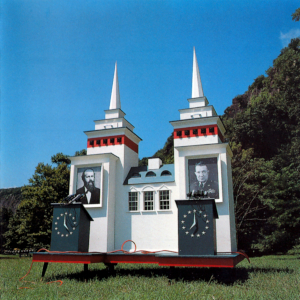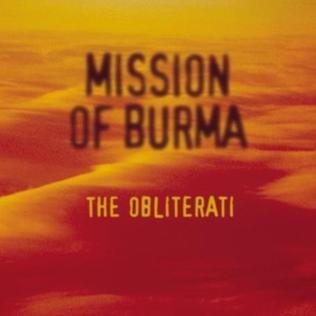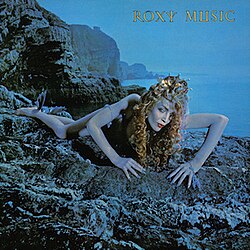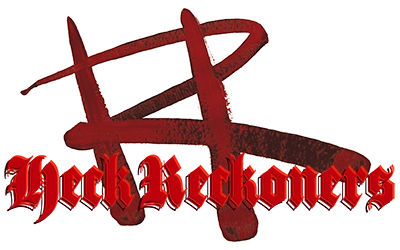David Thomas of Pere Ubu died last week at 71. He was listening to MC5 on the radio. The band wrote that “he will ultimately be returned to his home…where he insisted he was to be ‘thrown in the barn.’” Happy trails, cowboy.
Broad and heavyset, Thomas looked like Edward G. Robinson but he sang a high, pinched Great Lakes’ accent. You could say they don’t make men like Thomas anymore, but I don’t think they EVER made men like him. He was one of one. Thomas looked like a stevedore, sang like a banshee, and had an explicitly artistic mind.
In the early ‘70s, David Bowie became one of the first world famous musicians to sing with an English accent, but he looked and acted like David Bowie – a man so fuckable that Mick Jagger might’ve even taken a poke at him. Jagger would’ve probably mistaken Thomas for a teamster. And unlike Bowie’s charming lilt, Thomas’s singing voice was a strangled yawp, when he tried to hit notes at all. Often he bypassed words entirely, and just made sounds with his mouth and throat This was not the traditional front man of a 1970s rock and roll band.
But then he didn’t approach music like a 1970s rock and roll musician would either. He saw a song in three dimensions, like a visual artist would. Verses, choruses, and bridges became Lego pieces to plug in as he saw fit. He saw key and melody as suggestions. To Thomas, a song was an objet d’art, something to be pulled apart, reconfigured, and turned on its head.
One of Pere Ubu’s catchiest tracks is a reimagining of the shanty “Drunken Sailor” renamed “Caligari’s Mirror.” The band surrounds the sing-along chorus with woozy synthesizer burbles, presumably mirroring (har-har) Thomas’s shithoused seaman stumbling back to the boat: “Walked around / took a bus.” What do you do with a drunken sailor? Put him on public transportation. They make a song that everyone knows discordant and nervy, and yet still maintain its rousing chorus. One hell of an arrangement.
Alongside Bowie’s Berlin trilogy, Wire’s first three albums, and The Cure’s depression trilogy, Pere Ubu’s The Modern Dance, Dub Housing, and New Picnic Time is a Hall of Fame three album run. It’s foundational to post-punk and new wave. After punk bands ran out of gas going 100 MPH into the end of the 1970s, they relied on bands like Pere Ubu to show them where to take their music next. If Ubu ever makes it into the Rock and Roll Hall of Fame (and who cares if they do?), it will be on the strength of these albums, which show them increasingly warping and distorting garage rock until it’s pulled apart completely. The band uses the basic ingredients of a rock – guitar, drums, bass, piano, the exquisite synthesizer work of Allen Ravenstine, and a bassoon or two – and find a dozen different ways to turn their songs inside out. In the course of a couple bars, Ubu go from playing something quite standard to something really bizarre. Yet, even that standard-sounding stuff has the Crocus Behemoth – Thomas’s nickname – wailing atop it. No one would mistake this for Grand Funk Railroad.
Like many bands of the era, Ubu broke up and reunited many times during the course of their career. Their, I believe, twentieth album is still forthcoming. Each new iteration of the band brought in new members and new sounds. They even made play for the mainstream with Cloudland, whose single “Waiting For Mary” made the Billboard Modern Rock charts. I’m partial to Pennsylvania and St. Arkansas, but I don’t have an exhaustive knowledge of their catalog.
Thomas’s solo records are even more experimental than the band’s, often featuring spoken word sections and acoustic instrumentation. He called his solo work akin to indie film productions, whereas Pere Ubu produces the big budget Hollywood fare. His solo work is strictly for fans only.
Before Pere Ubu became Pere Ubu, they were Rocket From the Tombs, an unexpectedly literary (though just as often rock stupid) garage rock band from Cleveland. Although RFTT didn’t record (until the 2000s!) anything beyond demos, they wrote a clutch of quality material, large enough to kickstart two HoF New York punk bands after they broke up, the artsy Ubu and the libidinal Dead Boys.
In the interregnum between the end of RFTT and their album debut, Ubu released the music that makes up today’s Heck Record, the collection Terminal Tower, as singles.
“Heart of Darkness,” “Final Solution,” and “Untitled” are punk/post-punk classics. “The Book is on the Table,” “Not Happy,” and “Cloud 149” indulge in the art rock excesses that could put off listeners, though they contain textures that have never been heard together before. This is all part of the Pere Ubu package. For every bit of rock, you’ll get a bit of wank.
The collection’s crown jewel is “30 Seconds over Tokyo.” Taking its name from the memoir of Captain Ted Lawson, it describes, from an airman’s perspective, the “suicide ride” of the Doolittle Raid, the United States’ first attack on mainland Japan after the Attack on Pearl Harbor.
The song’s entire six minutes is an exercise in tension and release. One guitar spools and unspools a riff. Another slips chords underneath it. A third enters and exits as it pleases, adding dissonance. For most of its runtime, the song simply churns, building and building, as Thomas sings in a ghoulish monotone, somewhere between Captain Beefheart and Bauhaus’s Peter Murphy. This is goth rock before goth rock. Hell, “30 Seconds over Tokyo” was released in 1975; it was post-punk before even punk. (Funnily enough, Wikipedia lists its genres as both “post-punk” and “proto-punk.” Uh, what?)
What makes the song a stone classic is its crescendos, in which every player attacks their instruments, filling the track with noise. This first happens about 3:00 minutes in. A boinging bass mimics the dropping of bombs, strummed guitars mimic their explosions, and Ravenstein’s synthesizer impersonates an airplane’s propeller. Then the song returns to its churning riff. Mission accomplished. Now it’s time to get home. Uhh….
The thing about the Doolittle Raid was that it wasn’t so much a tactical mission as a strategic proof of concept, a way to prove to an America demoralized by the Pearl Harbor attacks that they could make the Japanese pay. They sought to bomb the Japanese homeland.
To accomplish the mission, the US had to strip sixteen B-25s down to the bones and fill up every space inside that wasn’t full of bombs or crewmembers with extra fuel tanks. This extra gas would ensure the planes could fly from aircraft carriers in the middle of the Pacific and hit mainland Japan, but they did not guarantee a return trip. When Thomas sings the chorus: “Thirty seconds and a one-way ride / thirty seconds and no place to hide,” he’s mirroring the fears of the airmen who all volunteered for a very dangerous mission.
The song climaxes six minutes in. Thomas hammers the chorus, the guitars come unglued from the riff, and Ravenstein’s synthesizer squelches, evoking the ghostly apparition of airplanes falling out of the sky, swallowed by flames or the sea. And then, like the Beatles’ “I Want You (She’s so Heavy),” one of the song’s only precursors, it stops.
When the vinyl single returned from the pressing plant, the technicians worried they had messed it up because the end of the track sounded so distorted. Nope. It matched the master tapes exactly. It was perfect.
“30 Seconds over Tokyo” is one of my favorite songs, one of the first that made me want to write music. The first song I completed that wasn’t a total rip off was a churning, history-referencing dirge called “Castle Bravo,” about the US’s misbegotten nuclear test in 1954. Who else got into rock and roll through history?
“30 Seconds” was, of course, only the beginning of a wildly productive, wildly idiosyncratic career, which makes it so ironic that the band initially considered it a one-off. Thomas wanted to get the best thing that Rocket From the Tombs wrote onto vinyl. They hoped, at best, that future listeners would appreciate the track after picking it up in thrift stores. It didn’t exactly work out that way. People actually bought it at the time. I mean, it didn’t outsell ELO, but enough people paid their milk money for an apocalyptical song about dying in a fireball that Pere Ubu could have a career. That career ended up lasting for nearly 50 years.
Of the 80 airman involved in the Doolittle Raid, all but seven survived the “suicide mission.” Sometimes things work out better than you expect them to.






